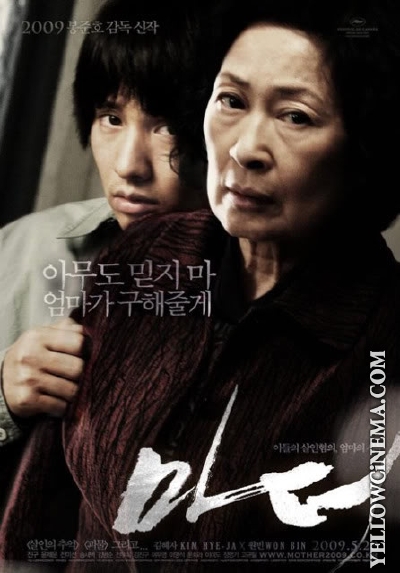Mother: Korean Seasoned Potato Recipe
Year Released: 2010
Directed by: Bong Joon-ho
Starring: Kim Hye-ja, Won Bin, Jin Gu
(R, 129 min.)

"Sons are the anchors of a mother’s life." Sophocles
This Korean mystery seems a Hitchcock/Coen Brothers hybrid, full of ironic twists and dark humor, eccentric characters and tortured relationships as it plumbs the depths of a mother’s relentless devotion to her mentally challenged son.
Mother (Kim Hye-ja) – her lack of any other name is significant – runs an herb shop and practices a little off the books acupuncture on the side, but her morbid attention is on her twenty-something son, Do-jun (Won Bin), who has ample stores of adolescent rebellion to make up for any intellectual inadequacies. That and a childhood friend Jin-tae (Jin Gu) with a nose for trouble and a propensity to drag his simple-minded friend right into it with him.
It’s bad enough that Do-jun’s comic antics streetside get him clipped by a passing Mercedes, but it’s even more dangerous when Jin-tae sets after it with thoughts of revenge. Of course, what he’s really looking for is a bit of mayhem to lull away the boredom, with pal Do-jun his willing but forgetful puppet. Once they’ve tailed the careless drivers to the expensive golf club, Do-jun forgets the whole purpose of the trip and wanders languorously in the pond retrieving golf balls.
And if Do-jun’s brain isn’t addled enough on its own, his night of drinking later that night completely gums up the works. He stumbles home behind a teenage schoolgirl who ignores his mumbled attempts to pick her up, jumping back reflexively when she hurls a large stone at him.
The next morning she is found dead, a golf ball with Do-jun’s name on it in the vicinity. The local police have hardly ever handled a murder in this small town, so they are quite happy to have this “evidence” dumped into their laps and have no trouble manipulating a confession from Do-jun, who would rather sign quickly than admit that he cannot read the document in front of him. (This may remind some viewers of similar circumstances in Kate Winslet’s Oscar awarding winning role in the 2008 film The Reader.)
But the police have not reckoned with the relentless force of nature that bore Do-jun, a mother all the more protective because he is flawed. As in the typical Hitchcock piece, the police are anything but helpful, traipsing Do-jun to the scene of the crime for a staged reenactment while the town goggles at him, and he foolishly waves to them in spite of his handcuffs.
Even the high priced lawyer his mother hires is hopelessly corrupt, certainly no less venal than our American variety, but certainly not as slick, proposing a plea agreement to her in a bar as he carouses with his drunken confederates and giggling call girls.
The only way to prove her son innocent is for his mother to solve the crime, a task that she takes on with the same intense devotion she heaped on Do-jun before his arrest. Before she doted on him with special foods and herbs, even sharing her small bed with him. And yes, the Oedipal overtones are there in spades with just the right amount of ambivalence. Taunted about whether he has slept with a woman by his friend Jin-tae, Do-jun replies that he sleeps with his mother. And when he stumbles home from his night of drinking, Do-jun does climb into bed next to his mother, she on top of the covers, he underneath them.
Now Mother stalks through the narrow alleys and the tin shacks to find evidence to clear him. Her pursuit is both dogged and comically absurd. In one particularly telling scene she trudges through the rain and mud, snatching an umbrella from a junk vendor as he passes by, but she is honest enough to pay him, even if he has not noticed her take it. He, in turn, returns one of the bills she has thrust into his hand. She crashes the funeral of the poor dead girl and incurs the wrath of her grieving family; she spies from closets, and wears plastic gloves to gather evidence, even though hers look more like the cheap cellophane type that come with over the counter hair dye than the Miami: CSI variety.
Won Bin is more than convincing as the mentally disabled son, his mind a lethal mix of youthful upheaval and stunning incompetence. He forgets greats swaths of memory and then is hammered by images and aftershocks long afterward. He cowers behind his mother’s skirts and then rebels against her advice, a convincing man-child that makes Tom Hanks’ performance as Forrest Gump seem overly cute and preening.
As one critic put it, character isn’t so much developed as it is revealed, bit-by-bit. The same might be said for the plot with all its twists and turns. The clues are subtle but carefully laid. You may not see what is coming, but you have been put on notice quite fairly early on.
The ending is clean, though it may not be entirely satisfying, with just the right amount of purposeful ambiguity to strike the requisite chord of dissonance that seals it in our memory.
Not to miss, especially since it is now Netflix.
—Kathy Borich
Film-Loving Foodie
Not only does Do-jun’s mother cook special foods for him, she coaxes him to eat each bite like a hovering nanny. No wonder he flees to the sidewalk across the street or the local café, where the nutrition, if you can call it that, is more of the liquid variety.
But no one would need to coax Do-jun to eat our delicious side dish, Korean Seasoned Potatoes, with garlic, sesame seeds, scallions, and a sweet soy sauce.
You might also like this main course to go along with it: Korean Style Grilled Chicken
Korean Seasoned Potatoes
This traditional side dish is simple and fast to prepare. It goes with almost anything.
Serves 4
Ingredients
- 2 medium potatoes
- 2 tablespoons soy sauce
- 2 teaspoons sugar
- 1 teaspoon garlic, minced
- 2 teaspoons sesame seeds
- 1-2 teaspoon sesame seed oil
- 4 tablespoons scallions, minced
Directions
- Peel potatoes and dice, placing in cold water to prevent browning. Drain and place in saucepan with just enough water to barely cover potatoes. Bring to boil and cook just until tender, 3 to 4 minutes.
- Meanwhile, in bowl, combine remaining ingredients.
- Drain cooked potatoes well and add to soy sauce mixture, tossing well.
- Chill.
- This is meant to be served as a cold side dish.
Recipe Source: Recipezaar.com



 Classic & Crime
Classic & Crime